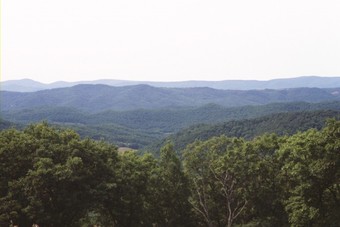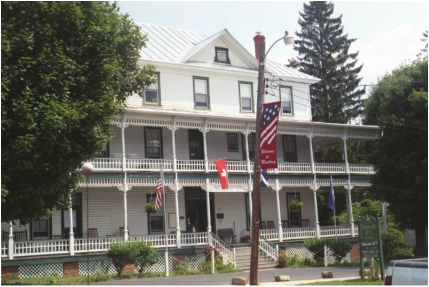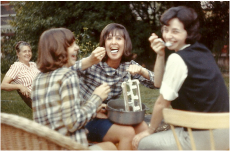 It was early in the evening on a day that had been a little off-kilter when I saw her coming down the sidewalk of downtown Lexington, Kentucky. It was an overnight step on my way to Virginia for the little May book tour. I’d always wanted to explore the city, so I booked a pricey room at an old inn since I was indulging myself before an unwanted surgery that I would have at the end of the tour. On the way down through Southern Indiana on SR 37, a two lane road that wound through fields of golden ragwort and miniature towns, I begin to fret over my haircut. Obsess really. A fairly new cut for me. It’s asymmetrical and loosely based on the haircut of Claire Underwood, a ruthless strategist on the Netflix series House of Cards. I’d tried wearing my hair long, up in buns and French twists, but it’s too thin and the style made me look like an old lady (which, of course, I am). I wanted something more modern, more radical. Something that rocked. And this haircut did. I even had blue streaks in it. But I blew the follow up trim (it can be hard to replicate the original cut, easy to lose that je ne sais quoi of the new cut). I’d been late to the appointment. So my stylist was rushed. She asked me how long in the back. I told her to just do whatever. I should have said short. It was frumpy and too long in the back. I wanted to look as good as an old lady could for the book tour. So when I got to Lexington, I Google Mapped for the hair salon closest to the inn and lucked into a stylist in between appointments to get the back cut short, short, short! Don’t touch the sides or front, don’t use hair thinning shears or razors; I want a good scissor cut. I showed her photos of Claire Underwood’s hair cut pulled up online on my phone. And I got want I wanted. But the rest of the day I couldn’t quite get my way. My room at the inn felt very tired, the furniture not antique but just cheap, beat, old stuff, the carpet looked like it was from the 90s, and the bedspread was one of those awful things that you don’t even what to touch but have to take it off and put it in the corner. The inn had a restaurant but it seemed pretentious yet uncomfortable, the fatty food expensive. I wandered the few blocks to downtown Lexington. I stopped at a brew pub, sat in a black padded swivel chair at a long bar facing a brick wall with oversized posters. The music was loud. Several minutes went by without a bartender even glancing my way, despite my hip haircut with the short short back. So I left. I walked and walked and walked, harassed over and over by the same drunk panhandler. Nothing looked good. I ended up at another little brew pub close the inn. Had a local beer, some bar food, and an odd, depressing conversation with man who sold furnishings to universities about his iron sculpture business that failed even though celebrities had purchased his work. Before turning in for the evening the next day's drive to Lexington, Virginia, I began to think about my breakfast. I’m picky about breakfast. I don’t need a lot, but I want a healthy one. Yogurt with fresh fruit is nice. The inn’s restaurant offered a yogurt on their breakfast menu for 10 dollars. Nope. That won’t do. So I walked a few blocks to a little store on Short Street called Shorty’s and bought a little container of semi-fake, fruity yogurt, a banana, and a bag of local granola. And this is when I saw her. On the way back to the inn. Walking toward me. She had this dramatic, kick-ass asymmetrical haircut and was wearing a white t-shirt printed with a large black “United.” She looked at me as the distance between us shortened and smiled nervously. I was focused on her hair cut and how cool she looked. She had a rebellious but not callous vibe; somewhere in her 20s I guessed. I smiled back. When we grew even on the sidewalk, she stopped to speak to me. That’s when I saw that the shaved side of her head wasn’t a cool, rebel cut. It had a heartbreaking arc of metal surgical staples that must have spanned four inches. She asked me if I could help her. She explained that she’d just had brain surgery. Well, that sure was obvious. I recognized those staples from Jim’s brain surgery, the one he had when his lung cancer spread there, just a few months before he died. She showed me a catheter port on the taped to back of her hand and told me she was doing cycles of both chemo and radiation. She was so tired, and it was hard to think clearly. She was forgetting stuff. And for some reason her credit card didn’t work at the gas station, and she was out of gas. So she had left her car at the station and started walking to see if she could beg some cash for gas. There weren’t many people on the sidewalk and so far, all that had happened was that some guy had cussed her out. This was no drunk panhandler. She looked completely fatigued, so so weary. I asked her to sit down on some nearby steps with me. She’d had seizures at work, that’s how they’d discovered the cancer. And she was trying to keep her job, but it was hard. They’d taken out a chuck of her brain about the size of fist. And there was still more cancer in her brain that was harder remove. If the chemo and radiation didn’t work, then they would do a second operation. The size of a fist. That’s what my oncology surgeon had told me. I had abnormal cells in my left breast that were the size of a fist. Is this taught in medical school? How to describe the size of tumors. Big as a thumb. As a fist. What would be bigger? A foot? I almost never carry much cash. But because I was traveling, I had some. I pulled out my wallet and handed her a twenty. She looked down, paused, and then said. “It’ll take 35 to fill up the tank. Maybe by the time I need gas again I’ll have figured out what’s wrong with my credit card.” I gave her another twenty. And I told her about my breast fist. Beyond my closest friends and family, she was the first person I’d told. And about Jim’s cancer. And we talked for quite a while about how things just come from nowhere. She wanted to pay me back, send me a check. I told her no. Then she asked if she could give it my church. I told her to just help someone else when they need it. She stood to walk back in the direction she had come. “Live each day as it comes,” she said me before she left. “I’m keeping you in my prayers.” I can’t get her out of my mind. Every time I think about my hair cut now, I see her instead of the merciless Claire Underwood. And I feel lucky. My fist, once removed, turned out to only have a section of bad cells in the size of a tiny fingernail, as described by my surgeon as she held out her small Asian pinkie finger. Low-risk pre-cancer. I don’t need radiation. No chemo. Even though today my chest looks like a gruesome patchwork quilt, it will heal. But I bet this young woman won’t be as lucky.
11 Comments
 Virginia always takes me by surprise. I’ll be rearranging my NetFlix queue or doing some other essential but non-essential thing - cooking, dusting, or paying bills - and a green flash of Virginia darts in. The blue, hazy vistas. The open high mountain pastures. Fat yellow, black and white striped monarch butterfly caterpillars munching on milk weed. White two-story farmhouses with green roofs and wrap-around porches. The images elbow each other for room in my mind. I stop, pull back from whatever I'm doing, and let it all flow over me. I invite in those ancient folded Appalachian ridges that stretch from Newfoundland to Alabama and pull up little slices of Virginia luck. Pale pink spring cherry blossom petals blanketing the ground, up to my ankles. A sign in the window of the H&H Cash Store in Monterey, next to a poster for maple syrup and buckwheat flour: If we don’t have it, you don’t need it. The August heat hammering down any thought of moving quickly. Thousands of Arbogasts in the wide Shenandoah Valley and the steeps and flats of Highland County. Tiny Willie’s Pit BBQ hole-in-the-wall BBQ in Staunton that’s not there anymore.
 And then, a few days later on Tuesday, April 26 at 7 p.m., after I have checked in and found my long-lusted-after seat in a rocking chair on the second story porch at the Highland Inn in Monterey, high up in the "little Switzerland" of Virginia, I am lucky enough to do a reading at the public library. It was in Highland County that I began to understand that in the debris of Jim’s death was a remarkable gift, really a rare chance to remake myself --the core of Leave the Dogs at Home’s story: Here's an excerpt: White picket fences announced McDowell, which was really just a few houses along the road. It was easy to find the old house—it was the only brick house in town. It was a Hull family house built in the 1800s that had served as a Stonewall Jackson headquarters, a Civil War hospital, a hotel, a stagecoach stop, and now a museum. I left the girls in the Element under a lone tree several blocks away, every possible window open, water dish filled to the brim, and calculated I had an hour before the sun moved from behind the tree to beat down on them. A stray breeze moved through the thick air. Maybe it was slightly less hot here. My elderly cousin was waiting for me upstairs at a heavy wooden table in a room lined with genealogy books. The slight scent of mildew tickled my nose. An air conditioner cranked noisily in the window. My shorts and T-shirt seemed disrespectful next to his white pressed shirt and brown suit and tie. He listened to me recite my lineage, nodding his head at each generation. Elizabeth and Michael. Elisabeth and David. Katherine and Enos. Isabele and Sanford. Cordelia and Enos. Pearl and Straud. Maxine and Elmore. “Yes, I know your family,” he said. “And I know where the old house is.” I unfolded a map and scooted it across to him. He ran his thin, smooth fingers over the web of back roads. “The old house is here,” he said, tapping at the map with his index finger. “In the field behind a newer house. As you drive around this curve you can just see it. It’s before the road turns to gravel and goes up the mountain. It was in Arbogast hands until a few years ago, but they had to sell.” Three hours later I pulled the truck over onto a small grassy shoulder in the curve of road next to a flock of sheep, the dogs whining to chase the herd. I thought this spot might be where my cousin had pointed to on the map. There was an old house set back far away. I couldn’t really see. The air undulated in the broiling sun. And then it hit me. It didn’t matter if this was the house or not. What mattered was how Michael had broken free from the restraints and traditions of the old ways to find a new way in a new land. He had left the old wars and took on new ones. While others cried and whined over being duped by the Soul Traders, he served his time and made his dream happen. Who knows what misery and horror he might have seen, being the only survivor of his German family, who may have been wasted by typhoid fever or mowed down in war. But Michael built a better life on the disaster of their deaths. As surely as he mourned them, he lived proudly and made Arbogast a name that rings with honor across the Shenandoah Valley. My Jim and career disasters seemed so shallow in comparison and my bleak grief over the loss of the former me so indulgent. But one thing was for sure: my life was getting better. I wasn’t headed for just a different life, but a better one and a better me. One that would not be here if Jim were alive. And it was time to be grateful and unabashed about living it. This is verboten thinking. Widows and left-behind lovers are never supposed to say this. We’re supposed to say that our relationships and marriages were perfect. You were crazy in love. It’s like half of you is gone, He was everything to me. Once your main squeeze kicks the bucket, the union, no matter how complicated or imperfect, becomes sacrosanct. The dead one golden and wonderful, the one left behind without a reason to go on. All the bad times must fall away, and only the good times can remain. We are allowed to stumble onward, bravely. We are allowed to heal and learn to enjoy life again. We are allowed to love again. But we are not supposed admit that life is better after a lover’s death. I needed to write about this, but I didn’t want to. People would think it was cathartic, therapy writing, a cleansing. A way for me to process my emotions. But I was doing just fine processing. I didn’t even think I was forging new ground. All I was doing was walking a path walked by many but unspoken of, and these important things needed to be said out loud. It’s not that I was glad that Jim was dead, but he was. And because of the chaos of his death I had a chance to break out of my crystallized and hardened patterns of predictability, to crack the calcified static of my life. In the rubble of Jim’s illness and death, I had a chance to walk into the next stage of my life with a new perspective. Some people never have, or take, this chance; instead they become frozen into who they are, what they think, how they act.”  Eating ice cream on Daddy's birthday, a family tradition of oh so long ago! Eating ice cream on Daddy's birthday, a family tradition of oh so long ago! Tuesday was Arbogast feast day. I was so busy, I forgot to celebrate. I almost always forget. You'd think I'd remember, because the 21st is also my father's birthday, a memory rich with vats of homemade ice cream and plates heavy with thick-sliced tomatoes. oh well. Instead I will give a nod to my 5th great grandfather, Michael who, with his wife Elizabeth, started up the Arbogast clan that arose from Virginia. Michael immigrated from Cologne, Germany where he was born in 1734. He arrived on the Speedwell in Philadelphia at age 17, parents and siblings all dead, and threaded his way through the big mountains west of the Shenandoah Valley to Highland County in 1758. These days, Arbogast is known as a "good valley name" and the graveyards are full of Arbogast tombstones, unlike Indiana. Immigrants from Germany, England and Ireland (plus a few folks wooed from Pennsylvania) were the ones who felled the trees in Virginia to made way for the farms, and to pay off their passage. He was naturalized in 1770, patented 130 acres there in 1773 and added more acreage over the years. He married a natural born Virginian and fathered two rarely noted daughters and seven oft-noted sons (several of whom served in the American Revolution). He died at age 79. In his will, he left his wife "one-third possession of at the time of my decease for and during her natural life time and her to keep possession of the dwelling house where in I live during the said period of her life and the adjoining to said house and all the under of following articles: to-wit, her bed and furniture, one pot, one baskin, one dish, two plates, two spoons, one fleish fork, one laddle, one kettle, one coffee pot, two teacups and saucers, one set of knives and forks, lisc (?) tin cups, two chairs, one large chest, one spinning wheel, one wool wheel, one pair wool cards, one pair cotton cards, the table in the house, all her books, her saddle and bridle, one tin bucket, three coolers for milk, two head sheep, two of my best milk cows, one horse creature, of not less value than fifteen pounds currant money, all her clothes, and the mulatto girl named Nancy." I hope things worked out okay for Nancy. My 4th great grandfather, David Arbogast. and his brother Michael, and "their heirs from them" were excluded. Maybe they had already received their shares when emigrating on to the east, or maybe there just wasn't enough room in Virginia for all of those big Arbogast personalities. Michael moved over the mountain to establish Arbovale, now part of West Virginia. David moved to Indiana, leaving his twin brother behind. David, who with his wife Elizabeth had five sons and four daughters, died at 109 years of age in Andersonville, in Posey Township - about two hours away in the northwest corner of Franklin County. Originally known as Ceylon, was laid out in 1837 by Fletcher Tevis, and renamed in 1849 after Thomas Anderson, a tavern owner. David was living in Virginia when he was 49, and it looks like all the kids moved with him, so the next 50 years surely were interesting. |
Inside
|


 RSS Feed
RSS Feed